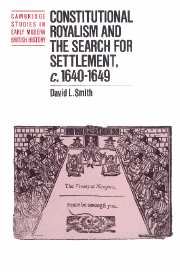Book contents
- Frontmatter
- Contents
- Acknowledgements
- List of abbreviations
- A note on quotations, sources, dates and terminology
- PART I THE ORIGINS OF CONSTITUTIONAL ROYALISM
- PART II CONSTITUTIONAL ROYALISM IN THEORY AND PRACTICE, 1642–1649
- 5 Chronological outline: negotiations formal and informal
- 6 Issues and sticking-points
- 7 The theory of Constitutional Royalism
- PART III CONSTITUTIONAL ROYALISM IN PERSPECTIVE
- Bibliography
- Index
- Cambridge Studies in Early Modern British History
5 - Chronological outline: negotiations formal and informal
from PART II - CONSTITUTIONAL ROYALISM IN THEORY AND PRACTICE, 1642–1649
Published online by Cambridge University Press: 01 October 2009
- Frontmatter
- Contents
- Acknowledgements
- List of abbreviations
- A note on quotations, sources, dates and terminology
- PART I THE ORIGINS OF CONSTITUTIONAL ROYALISM
- PART II CONSTITUTIONAL ROYALISM IN THEORY AND PRACTICE, 1642–1649
- 5 Chronological outline: negotiations formal and informal
- 6 Issues and sticking-points
- 7 The theory of Constitutional Royalism
- PART III CONSTITUTIONAL ROYALISM IN PERSPECTIVE
- Bibliography
- Index
- Cambridge Studies in Early Modern British History
Summary
The aim of this chapter is to establish the basic narrative of peace talks between Royalists and Parliamentarians from the outbreak of the Civil War to the Regicide. It is written very much from the perspective of Constitutional Royalists, and seeks to recover their role in promoting and conducting such talks. It will analyse their involvement in informal peace initiatives as well as in the great set-piece treaties of Oxford, Uxbridge, Newcastle and Newport. Throughout, a familiar cast appears: Richmond, Southampton, Hertford, Lindsey and Dorset were the figures who most consistently urged Charles to keep talking with the two Houses. These peers emerge as the most important practitioners of Constitutional Royalist ideas during the period of the two Civil Wars, while Hyde, Falkland and Culpepper gradually became less influential and closely allied than they had been in 1642. By 1646 Falkland was three years dead, Hyde was increasingly isolated, and Culpepper was more closely aligned with Sir Henry Jermyn and John Ashburnham. All four were now in exile, and the main political exponents of Constitutional Royalism within England were a close-knit cluster of moderate peers.
Only three days after Charles raised his standard, Royalist moderates persuaded him to send peace commissioners to Westminster. Southampton advised the King that a message to Parliament 'might do good, and could do no harm'; while Culpepper 'was as earnest to persuade him to it as any man'. Charles was 'offended' and 'exceedingly afficted', but finally agreed to send Southampton and Culpepper – together with Dorset and Sir William Uvedale – to inform the Houses of his 'constant and earnest care to preserve the publike peace'.
- Type
- Chapter
- Information
- Publisher: Cambridge University PressPrint publication year: 1994



